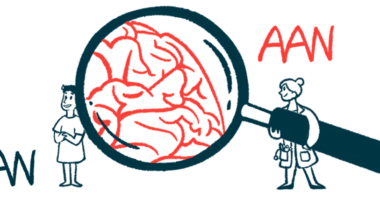GlobeStar, AIP team up to design clinical trials for Project Amethyst
Therapy seen to improve motor control, balance in MS patients in study

GlobeStar Therapeutics (GSTC) is teaming up with Advanced Innovative Partners (AIP) to design and implement clinical trials of Project Amethyst, an investigational therapy for multiple sclerosis (MS) that aims to reduce neurodegeneration — when nerve cells in the body lose function and ultimately die.
The new memorandum of understanding (MOU) between the two biotech companies follows the release of early clinical trial data from Italy showing the Project Amethyst compound improved motor control and balance in people with MS.
The MOU intends that GSTC, which holds worldwide licensing rights to the therapy, will lead the effort, once certain conditions are met. The Washington and Florida-based company will contribute related rights and be responsible for financing, manufacturing, supply chain, and sales. AIP, based in Miami, will find healthcare partners to assist with clinical study, manufacturing, and drug distribution of the MS therapy candidate.
“Given AIP’s strong global relationships with universities, medical associations and hospitals, with its considerable experience in clinical trials, we are delighted that AIP will collaborate with GlobeStar to advance trials for Project Amethyst,” James C. Katzaroff, GlobeStar’s president and CEO, said in a press release.
Project Amethyst shows promise in early study in Italy
MS is an inflammatory disease of the brain and spinal cord, with symptoms varying from person to person depending on which parts of the nervous system are affected. Problems with body movement, such as difficulty walking or a loss of balance, are the most common signs of the disorder, followed by fatigue, chronic pain, and vision impairment.
For individuals living with MS, disability is primarily assessed using the Expanded Disability Status Scale (EDSS), in which higher scores reflect worse disability.
The preliminary efficacy of Project Amethyst — intended to target neurodegeneration in people with MS — was demonstrated in a recent Italian clinical study that enrolled 150 volunteers. Among them were 90 MS patients, ages 25-65, as well as 60 healthy individuals who served as controls.
During the pre-treatment phase, the average EDSS scores for the MS patients dropped by at least 1.3 points, and by 4 points after a total of 45 days of treatment. Over both time periods, those drops indicated lessened disability.
All participants reported improvements in motor control and balance in the arms and legs, and most reported better bladder control.
“We were impressed with the clinical results obtained in Italy for treatment of multiple sclerosis patients using Project Amethyst,” said Stanley Satz, PhD, AIP’s chairman and chief science officer.
“These results provide a good foundation for establishing more comprehensive clinical trials with AIP’s partners,” Satz said, adding, “We are thrilled to advance the opportunities for Project Amethyst.”
We were impressed with the clinical results obtained in Italy for treatment of multiple sclerosis patients using Project Amethyst. These results provide a good foundation for establishing more comprehensive clinical trials with AIP’s partners.
According to Satz, AIP has “considerable domestic and international experience” in launching clinical trials, with “world renowned colleagues” with expertise testing potential therapeutics for various diseases and disorders.
For his part, Katzaroff noted that his personal relationship with Satz “extends over decades.”
“I am grateful for his and AIP’s support,” Katzaroff said.







